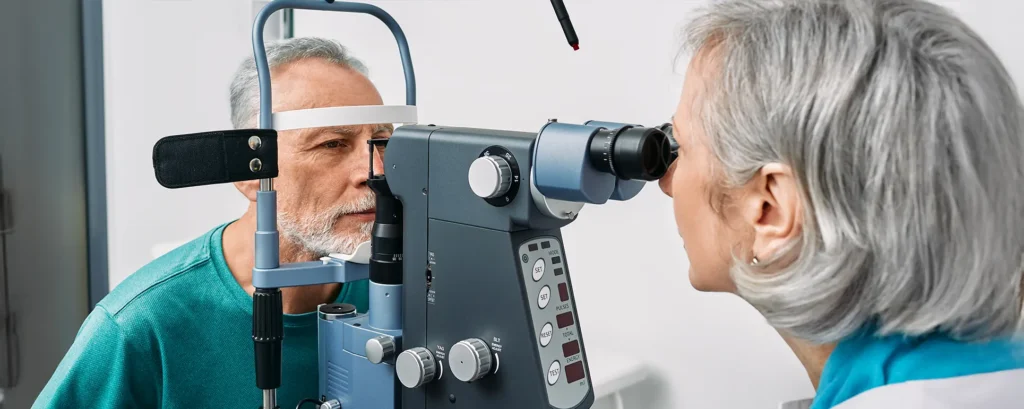Cataract surgery is usually straightforward — but when you have a chronic condition like psoriasis, things can get a little more nuanced. Many people think of psoriasis as just a skin condition. But in reality, it’s a systemic inflammatory disorder, and that has implications for your eyes, especially if you’re heading into surgery. From immune-modulating medications to the risks of delayed healing or flare-ups, there’s a bit more to consider.
If you’ve been told you have cataracts and you’re also living with psoriasis, you’re not alone — and there’s good news. Cataract surgery is still very doable. But your surgical team will likely adapt parts of your care plan to take into account your medications, skin condition, and overall immune health. Whether you’re using topical treatments or biologics, it’s important to understand how your psoriasis could interact with the surgical process, and what steps can be taken to keep everything on track.
Let’s walk through what you need to know.
Understanding Psoriasis as a Systemic Condition
Psoriasis is more than what you see on the skin’s surface. At its core, it’s an autoimmune condition — which means your body’s immune system mistakenly attacks healthy cells. This immune activity doesn’t stay limited to the skin; it can affect joints (as in psoriatic arthritis) and even internal organs. The eyes are not excluded from this list.
This systemic inflammation means your eye structures, particularly the uvea (middle layer of the eye), can become inflamed too. This condition, known as uveitis, is more common in people with psoriasis than in the general population. Even if you’ve never had eye symptoms before, your medical team may monitor you more closely for signs of ocular inflammation during cataract surgery preparation.
And it’s not just the immune system that matters — your skin health around the eyelids can be another concern. Psoriatic plaques on the eyelids or scalp can make sterilisation for surgery more delicate, and post-op healing requires careful hygiene.
The Impact of Psoriasis Treatments on Cataract Surgery

If you’re on systemic treatments like methotrexate, cyclosporine, or biologic agents (e.g. adalimumab, secukinumab), your immune system is being intentionally dampened to control flare-ups. This can be a double-edged sword. On one hand, it helps reduce systemic inflammation that could interfere with healing. On the other, it increases your susceptibility to infections — including eye infections post-surgery.
Your ophthalmologist and dermatologist may coordinate on whether your medication should be paused or adjusted before the operation. This is especially relevant if you’re receiving injections on a regular schedule. Some doctors recommend timing the surgery between doses when immune suppression is at its lowest. Others may feel it’s safer to continue uninterrupted, depending on your overall stability.
Topical treatments like steroid creams around the face or eye also play a role. Long-term steroid use — even topical — is associated with a higher risk of cataracts. Your surgeon may ask for a detailed history of how often you’ve used these medications, as it can influence lens opacification and risk of secondary complications.
Managing Ocular Surface Inflammation in Psoriatic Patients
The ocular surface — that delicate interface between your eye and the outside world — can be affected by psoriasis. Dry eye, blepharitis (eyelid inflammation), and meibomian gland dysfunction are all more common in people with psoriasis. These conditions may not sound serious, but they can affect how well your eye heals after surgery, how comfortable you feel, and even how well your vision recovers.
Dryness can interfere with the accuracy of your pre-operative measurements (used to select your lens implant), and post-operative irritation can increase the risk of infection or delayed healing. Your eye surgeon may recommend pre-treatment for dry eye or lid inflammation weeks before your cataract operation — this could include lubricating drops, anti-inflammatory eye drops, or even short courses of oral antibiotics.
In some cases, ocular surface management is so critical that surgery may be postponed until these issues are better controlled. It’s not about being overly cautious — it’s about giving you the best possible chance of a smooth recovery and crisp visual results.
Psoriatic Arthritis and Cataract Surgery Planning

If you have psoriatic arthritis, your joints may already be limiting your mobility. This can become a consideration during surgery positioning. Cataract surgery requires you to lie flat and still for 10–20 minutes. If neck or back pain makes this difficult, adjustments can often be made — such as supporting your head with extra pillows or using a more reclined surgical chair setup.
Your anaesthesia team should be made aware of any joint stiffness or medication use that could affect blood clotting, bleeding risk, or breathing patterns during light sedation. It’s also worth discussing how to manage your arthritis medications around the time of surgery, especially if you’re on NSAIDs or biologics that may impact healing or increase bleeding risk.
What’s often forgotten is that psoriatic arthritis can affect the small joints of the hands. If you’re planning to self-administer eye drops after surgery, make sure your grip and dexterity are up to the task — or arrange for help from someone at home during recovery.
Addressing Flare-Ups Around the Eyes
If you’re experiencing a flare-up of psoriasis around your eyelids or eyebrows, your cataract surgery may need to be postponed. Open surgical wounds and inflamed skin do not mix well — the risk of infection or poor healing is just too high.
But flare-ups can also be mild and manageable. If the affected area is not within the sterile field or can be protected during surgery, your surgeon might go ahead with extra precautions. They may work alongside your dermatologist to bring the flare under control first, often using non-steroidal anti-inflammatory topicals or UVB therapy.
After surgery, even a mild flare around the eye can make you more prone to rubbing — something you must avoid during cataract recovery. Keeping your hands clean and your skin hydrated (with doctor-approved emollients) will reduce this risk significantly.
Special Considerations for Biologic Therapy
Biologic therapies have revolutionised how moderate to severe psoriasis is treated. However, they come with complex implications during surgery. These drugs — such as infliximab, ustekinumab, or ixekizumab — selectively target parts of the immune system like TNF-alpha or IL-17, which play a role in inflammation. While this can keep psoriasis at bay, it also means your immune defences are not fully alert.
Your surgeon may recommend additional antibiotic prophylaxis or delay the surgery depending on your dosing schedule. There’s also a small concern about poor wound healing with biologics, though this isn’t proven in every case. What’s clear is that your dermatologist and eye surgeon need to coordinate, ideally with your GP too, to time your biologic injections strategically around the surgery window.
You should never stop or adjust these medications on your own — the risk of a psoriasis flare could be worse than the surgical concern itself.
Cataract Surgery Outcomes in Patients with Psoriasis

So, how do patients with psoriasis actually do after cataract surgery? Generally, outcomes are very positive — but recovery might require a little more monitoring. Visual acuity tends to improve significantly, provided there are no major complications from inflammation or infection.
One known risk is the development of posterior capsule opacification (PCO), a common side effect where the lens capsule becomes cloudy months or years after surgery. Some studies suggest inflammation-prone eyes — like those in autoimmune diseases — might develop PCO sooner. Luckily, this is easily treatable with a quick laser procedure called YAG capsulotomy.
Your risk of dry eye may persist after surgery, especially if your psoriasis affects the lids or conjunctiva. But these symptoms can be managed long term with drops, heat therapy, or prescription anti-inflammatories.
Lifestyle and Recovery Tips Tailored for Psoriatic Patients
After surgery, you’ll need to keep your eyes protected and avoid strenuous activities. But when you have psoriasis, there are a few extra tweaks you can make. Firstly, ensure you’re not exposing your skin to harsh chemicals or scented cleansers around the eyes — even if they’ve been fine on your body, the skin near your eyes is more delicate post-surgery.
Second, if you have joint stiffness, consider using an eye drop aid — small plastic devices that make applying drops easier. They’re cheap and can help you stay consistent with your medications during the crucial early recovery phase.
Finally, flare prevention is key. Stress, poor sleep, and medication disruptions can all make your psoriasis worse — and this might, in turn, affect your eye health too. So during your recovery, prioritise rest, hydration, gentle skincare, and regular follow-ups.
FAQ: Cataract Surgery and Psoriasis
- Can I still have cataract surgery if I have moderate to severe psoriasis?
Yes, cataract surgery is still an option even if your psoriasis is severe or widespread. However, it does require more careful planning. Your ophthalmologist will take into account your current treatment plan, any history of flare-ups near the eyes, and whether you have any signs of active inflammation. In most cases, the surgery can proceed safely with some adjustments to ensure healing is smooth and complications are minimised. - Will my psoriasis treatment affect the outcome of surgery?
Your psoriasis treatment can influence your surgical experience, particularly if you’re on systemic medications like biologics or immunosuppressants. These drugs help control inflammation but can also slow healing and increase the risk of infections. Your surgical team may adjust the timing of your operation to align with your treatment cycle, and they might take additional steps such as prescribing antibiotics or anti-inflammatory drops to help your eyes recover properly. - Do I need to stop my biologic medication before cataract surgery?
Stopping biologic medication before cataract surgery is not always necessary, but it does depend on your individual case. Some surgeons prefer to operate in between biologic doses when your immune system is more responsive, while others may continue your schedule uninterrupted to avoid a psoriasis flare. This decision should be made by your ophthalmologist in consultation with your dermatologist or rheumatologist, and it must be carefully balanced to maintain your overall health. - Can psoriasis affect the inside of the eye?
Yes, while psoriasis is mainly known for affecting the skin, it can also cause internal inflammation within the eye, especially in the form of uveitis. This is more likely if you also have psoriatic arthritis. Uveitis can cause redness, pain, light sensitivity, and blurred vision — all of which may complicate cataract surgery. If you’ve experienced any of these symptoms in the past, it’s important to mention them during your pre-surgical assessments so that your team can monitor and manage any flare-ups effectively. - What happens if I have psoriatic plaques near my eyes?
If you have active plaques or inflamed skin around your eyelids or face, your surgeon may recommend delaying surgery until the area is under control. This is because cracked or broken skin near the surgical site increases the risk of infection. In less severe cases, your dermatologist may suggest treatments to reduce inflammation quickly, allowing the surgery to go ahead safely. The goal is to ensure a clean, stable environment around the eye so that your recovery is not compromised. - Are there extra risks of infection after surgery if I have psoriasis?
Yes, there can be a slightly higher risk of infection, especially if your immune system is suppressed by medications like methotrexate or biologics. The eye is generally good at healing, but immune-modifying drugs may reduce your natural defences. Your surgeon may prescribe prophylactic antibiotics and monitor you closely in the days and weeks following surgery. With proper planning and hygiene, the risk can be minimised significantly, and the vast majority of patients recover without complications. - How should I care for my skin around the eyes after surgery?
After cataract surgery, it’s essential to avoid using harsh products or heavy moisturisers near your eyes — even if they’ve helped your psoriasis elsewhere. Stick to mild, fragrance-free emollients approved by your doctor and avoid rubbing or scratching the area. Your eyelids and the skin around your eyes will be more sensitive during recovery, so keeping things clean and simple will help reduce irritation and lower the risk of complications like infection or delayed healing. - Will dry eye symptoms get worse after cataract surgery?
Dry eyes are a common issue after cataract surgery, and people with psoriasis are already at higher risk of this problem due to eyelid inflammation or meibomian gland dysfunction. If you’ve experienced dry eye symptoms before, let your surgeon know — they may recommend pre-treatment with lubricants or anti-inflammatory drops in advance. Managing this properly helps improve comfort after surgery and ensures that your vision recovers without unnecessary irritation or blurry patches. - Can psoriatic arthritis affect the surgery?
Psoriatic arthritis can make lying flat or keeping still during surgery more challenging, especially if your spine, neck, or joints are affected. It can also impact how well you’re able to apply eye drops afterwards if your hands or wrists are stiff or painful. Your team can make accommodations such as adjusting your position on the surgical table or recommending drop aids for home use. It’s important to let them know in advance about any joint-related issues that could affect your comfort or recovery. - What should I tell my eye surgeon before the operation?
Be honest and detailed when talking to your eye surgeon about your psoriasis. Tell them what medications you use — both systemic and topical — and whether you’ve ever had a flare near your eyes. Let them know if you’ve experienced dry eye, joint pain, or inflammation inside the eye. This information helps your surgeon personalise your care, anticipate any potential issues, and coordinate with your dermatologist or rheumatologist if adjustments to your treatment are needed before or after surgery.
Final Thoughts
Cataract surgery with psoriasis might sound like a complicated intersection of two very different conditions, but it doesn’t have to be overwhelming. With the right coordination between your ophthalmologist, dermatologist, and GP — and a little extra care with your eyes and skin — there’s every reason to expect excellent results. The key is planning ahead, knowing your risks, and not being afraid to speak up about flare-ups or medication side effects.
If you’re in the UK and looking for experienced care that understands complex conditions like psoriasis, the London Cataract Centre offers consultant-led cataract surgery with full pre-operative assessment and tailored recovery planning. You’re not just a pair of eyes — you’re a whole person. And your care should reflect that.
References
- Wu, D., Cai, R., Pang, Y., Ma, J., Chen, B. et al., 2025. Bidirectional association between uveitis and psoriasis: a systematic review and meta‑analysis. Clinical and Experimental Medicine, 25, Article 161. Available at: https://link.springer.com/article/10.1007/s10238-025-01693-0
- Mokbel, R., et al., 2025. Ocular complications in psoriatic patients: a systematic review and meta‑analysis. Journal of Ophthalmic Inflammation and Infection, published April 2025. Available at: https://joii-journal.springeropen.com/articles/10.1186/s12348-025-00486-6
- Fotiadou, C., Lazaridou, E., Sotiriou, E., Ioannides, D. and Vakirlis, E., 2025. Ocular manifestations of psoriasis: a comprehensive review. Dermatologic Therapy. Available at: https://www.tandfonline.com/doi/full/10.1080/09273948.2025.2459710
- ResearchGate team, 2021. Risk of incident cataract in patients with psoriasis: a population‑based cohort study. ResearchGate (based on Chang Gung Research Database). Available at: https://www.researchgate.net/publication/356778404_Risk_of_incident_cataract_in_patients_with_psoriasis_A_population-based_cohort_study
- Elm, J., et al., 2023. Psoriasis beyond the skin: Ophthalmological changes. International Journal of Dermatology and Venereology, review article. Available at: https://pmc.ncbi.nlm.nih.gov/articles/PMC8311223/

